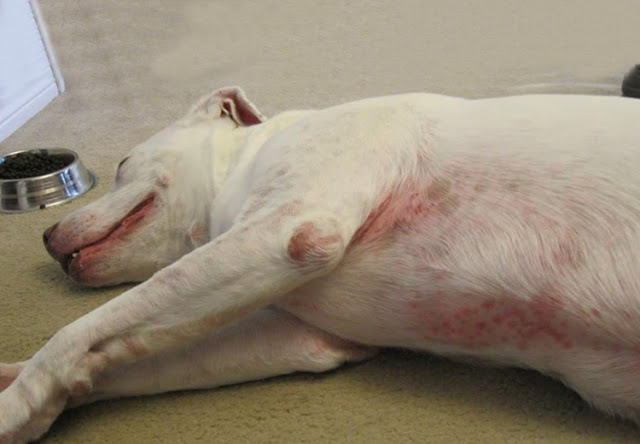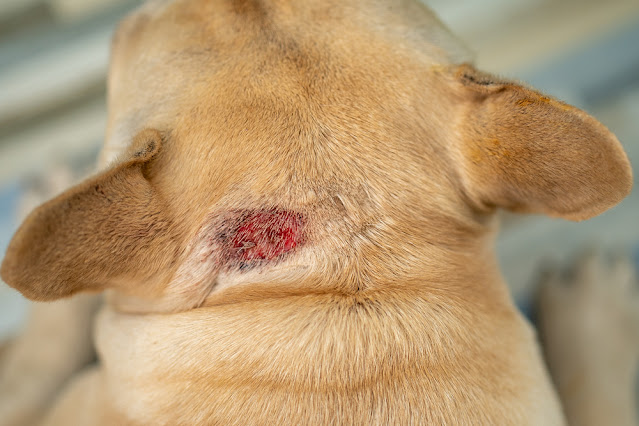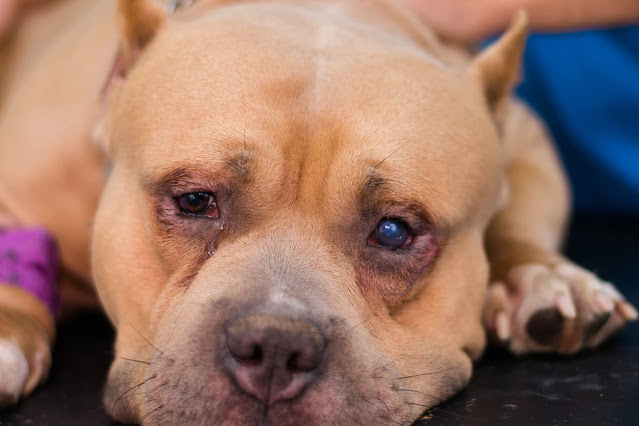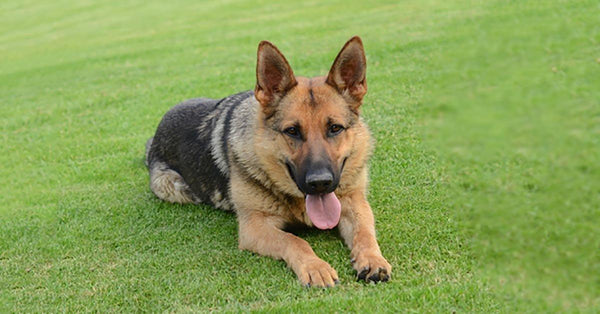Staying up-to-date on the most common diseases affecting dogs can help keep your furry friends healthy and happy well into their golden years. This comprehensive guide on 25 of the most common dog diseases includes everything from the types of symptoms each disease causes to how they’re diagnosed and treated to ways you can prevent them in the first place. Whether you have a puppy or an elderly dog, this list of the 25 dog diseases should be helpful in keeping your dog healthy and happy.
1. Bloat
Bloat is a life-threatening condition that can affect dogs of any age, breed, or size. It occurs when the stomach twists on itself, trapping gas and causing the stomach to swell. If not treated immediately, bloat can lead to shock, organ damage, and even death. Symptoms of bloat include a distended abdomen, drooling, restlessness, pacing, panting, and weakness. If you suspect your dog is suffering from bloat, take it to the vet immediately.
There are many things you can do to prevent bloat in your dog. Feeding smaller meals more often throughout the day instead of one large meal can help. Adding an anti-gas medication to your dog's food can also be helpful. Finally, have plenty of fresh water available for your dog at all times--if they drink plenty of water before or during a meal, it will reduce the likelihood of bloat developing. You can get dog probiotics chews
from amazon to help improve digestion.
2. Parvovirus
Also called parvo, this is a highly contagious virus that attacks a dog’s gastrointestinal system. The virus is found in feces, so it can be transmitted by contact with contaminated soil, water, or even another dog. Early symptoms include vomiting and diarrhea, which can lead to dehydration. Treatment includes hospitalization and intensive care. Prevention is through vaccination. Consult your veterinarian for more information. If you find that your dog has been exposed to the virus, you should immediately isolate him/her from other dogs until you know whether he/she has been infected. There are a few things you can do to help prevent your dog from contracting
First, make sure they are up to date on their vaccinations. Second, avoid contact with wild animals. Third, try not to let them drink any standing water or lick any surfaces that may have been contaminated by urine or feces. Lastly, wash all food and water bowls after use. Prevention is key in avoiding canine parvovirus.
3. Influenza
This
is a disease that is commonly passed between dogs, much like the human version
of the flu. Canine influenza can cause a dog to have a fever, runny nose,
cough, and decreased appetite. Most dogs recover within two weeks, but some may
develop pneumonia and require hospitalization. To help prevent the spread of
the flu, keep your dog away from other sick dogs and make sure they are up to
date on their vaccinations. If you think your dog has contracted the flu,
contact your veterinarian immediately. You should also monitor your dog for any
signs of respiratory distress or difficulty breathing. Signs of canine
influenza include fever, coughing, sneezing, eye discharge and lethargy.
Vaccination for this disease is available for puppies as young as six weeks
old. Ask your vet about which vaccine is best for your individual pup.
4. Dog
Skin Problems
Dogs are susceptible to a variety of skin problems; including allergies, hot spots, infections, and parasites. Allergies are the most common skin problem in dogs, and they can be caused by anything from environmental allergies to food allergies. Hot spots are another common skin problem in dogs, and they're usually caused by an underlying infection or allergy. To prevent hot spots, keep your dog's coat clean and dry and watch for any redness or irritation. Infections and parasites are also common causes of skin problems in dogs. To prevent these, keep your dog's environment clean and free of potential sources of infection, such as garbage or other animals.
Make sure you have your dog checked out by a vet if he has been outside or spending time around other animals, because these activities may put him at risk for parasites like fleas. Parasites like fleas can be prevented with monthly doses of anti-parasitic medication, as well as through regular grooming that gets rid of all dead hair and possible places where fleas might live on your dog's body. Finally, always try to feed your pup natural foods that don't contain ingredients that could trigger an allergic reaction; certain breeds may also need special diets to help relieve their allergies. You can get Zesty Paws Allergy Immune Supplement from amazon to help improve your dog health.
5. Allergies in Dogs
Allergies are the number one health problem in dogs, according to a survey of veterinarians. They can cause a variety of symptoms, including itching, scratching, sneezing, runny nose, and watery eyes. Some dogs may also experience hair loss, hot spots, or recurrent ear infections. Allergies can be caused by a variety of things, including environmental allergens like pollen or dust mites, food allergies, or even contact allergies from certain materials. The good news is that there are many ways to manage allergies in dogs. With some trial and error, you can usually find a treatment that works for your dog. For example, if your dog has skin allergies caused by an allergy to something in their diet, you could try switching their food brand or adding Omega-3 fatty acids.
If they have an allergy triggered by fleas or other parasites, it's important to get rid of these invaders first before treating the allergic reaction. Medications such as antihistamines and steroids are often used as well to relieve symptoms. Make sure you consult with your veterinarian before starting any type of treatment regimen for allergies in dogs. You can get Zesty Paws Allergy Immune Supplement from amazon to help improve your dog health. 6. Fleas in Dogs
Fleas are the common external parasite that attack dogs. These tiny insects feed off of your dog's blood, which can cause anemia and other health problems. Fleas can also transmit other diseases to your dog, so it's important to keep them under control. The best way to prevent fleas is to use a monthly spot-on treatment or oral medication prescribed by your veterinarian. You should also regularly groom your dog and vacuum your home to remove any flea eggs or larvae that may be present. It's best to avoid using chemical pesticides as they can be harmful if ingested. If you think your dog has been exposed to a chemical pesticide, bring him in for veterinary care immediately.
To help get rid of fleas, vacuum all areas of your house where your dog spends time (carpets, furniture, etc.). Always follow label instructions when applying chemicals to carpets and upholstery. Ask your vet about natural remedies such as diatomaceous earth (DE) powder and essential oils that may help repel fleas from your yard or home. Remember: never apply DE directly to your pet. You can get K9 Advantix II Flea andTick Prevention from amazon for your dogs.
7. Hot Spots in Dogs
A hot spot is a moist, irritated area on your dog's skin that's caused by excessive licking, chewing, or scratching. The affected area is usually red, inflamed, and painful. Hot spots can occur anywhere on your dog's body, but they're most commonly found on the head, ears, legs, or base of the tail. If your dog has a hot spot, it's important to seek veterinary care immediately. Treatment typically involves antibiotics and anti-inflammatory medication. To prevent hot spots from occurring in the first place, keep your dog's coat clean and free of mats. Regular brushing will also help remove any potential irritants from your dog's fur. In addition, make sure to give your dog plenty of water each day. Don't forget to provide your pup with toys and chew items so he doesn't resort to self-destructive behaviors like licking his paws.You can get Zesty Paws Allergy Immune Supplement from amazon to help improve your dog health.
8. Dog Eye Problems
Dogs can suffer from a number of eye problems, including allergies, infections, injuries, and tumors. Allergies are the most common cause of dog eye problems, but they can also be caused by infection, injury, or tumor. Treatment for dog eye problems depends on the underlying cause. Allergies can be treated with antihistamines or steroids, while infections may require antibiotics. Injuries may need to be treated with surgery, and tumors may require radiation or chemotherapy. Prevention is key in all cases; keep your dog's environment clean and free of allergens. If you have another pet in the home that has an allergy, consider getting your pup vaccinated for canine flu or even swapping homes with him for a week to see if symptoms improve. Make sure to consult your vet before giving any type of medication for your pup.
9. Kennel Cough
Kennel cough is a disorder in which a dog's trachea and upper respiratory
tract are irritated and damaged by infectious bacteria. There are two kinds of
kennel cough. The disease may show up as a viral or bacterial
infection. It is very infectious
from dog to dog, which is why dogs often get kennel cough after being in an
enclosed area where they are in close contact with other dogs. You can prevent kennel
cough in the following ways:
First, make sure your dog is up-to-date on all of his vaccinations. Kennel cough is caused by a number of different viruses and bacteria, so the best way to protect your dog is to make sure he’s vaccinated against all of them.
Second, avoid taking your dog to places where there are large numbers of other dogs. This includes doggy daycares, boarding facilities, dog parks, and even the homes of friends or family members who have dogs. If you take your dog to these places anyway, consider getting him a protective coat that will help keep infectious agents from entering his respiratory tract through nose or mouth contact with other dogs. Be sure that when you bring your pup home after visiting one of these areas, you clean him off with disinfectant wipes before letting him inside.
Third, if you live in an area with many stray animals and wildlife (such as skunks), use caution because kennel cough can be transmitted from those animals as well. Fourth, keep in mind that kennel cough is contagious for humans too - don't forget to wash your hands after handling any infected items. You can get HomeoPet Cough, Natural Cough Treatment for
Pets from amazon.
10. Lyme Disease in Dogs
Lyme disease is a bacterial infection that can be transmitted to dogs through the bite of an infected tick. Lyme disease can cause a variety of symptoms in dogs, including fever, lameness, loss of appetite, and fatigue. Lyme disease is treated with antibiotics, but it can be difficult to diagnose early on. The best way to prevent Lyme disease is to keep your dog away from areas where ticks are common and to use tick prevention products. Vaccines exist for some types of Lyme disease and may help reduce the risk of contracting the bacteria.
There are also a number of natural ways to protect your dog against ticks. One popular method includes rubbing diluted garlic oil onto their skin or spraying them with herbal repellents containing peppermint oil or citronella oil. Garlic works by producing compounds that are toxic to ticks and its scent deters them from approaching pets too closely. Dogs who spend time outdoors should wear a collar containing permethrin which kills ticks before they reach the animal's skin, giving it time to produce immunity against future bites.
11. Heart Disease
One of the most common dog diseases is heart disease. Heart disease in dogs can be caused by a number of things, including genetics, poor diet, and lack of exercise. Luckily, there are a few things you can do to help prevent heart disease in your dog. First, make sure that they get plenty of exercise every day. Second, make sure that they have access to fresh water at all times (if your dog doesn't like water from the tap, consider buying them bottled water). Third, be aware of any possible symptoms such as decreased appetite or weight loss and take them to the vet right away if you notice anything out of the ordinary. Finally, avoid foods high in fat content like bacon or sausage which could contribute to weight gain and heart disease risk. You can get Pet Wellbeing, a natural support for
Your Dogs Heart from amazon 12. Hip dysplasia
Hip dysplasia is a condition that affects the hip joint. The hip joint is a ball and socket joint, which means that the head of the femur (thighbone) fits into a cup-like socket in the pelvis. In dogs with hip dysplasia, the socket is shallow, so the ball does not fit snugly into it. This can cause pain and lameness. There are many breeds who are more likely to develop hip dysplasia than others including: German Shepherds, Golden Retrievers, Labrador Retrievers, Rottweilers, Doberman Pinschers, and American Staffordshire Terriers. Prevention for this disease is keeping your dog lean and active throughout their life. If you are going to be inactive with your dog for an extended period of time you should speak with your veterinarian about ways to prevent this disease from developing. You can get VetIQ Hip & Joint Supplement from amazon for
your dog. 13. Arthritis
Arthritis is a common condition that can affect dogs of any age, breed, or size. The most common symptom of arthritis is pain and stiffness in the joints. If your dog is showing signs of arthritis, there are several things you can do to help ease their pain and improve their quality of life. Consider giving them aspirin (dogs can take baby aspirin) for temporary relief from joint inflammation. Make sure you consult your vet before administering any medication. Joint supplements like glucosamine hydrochloride have also been shown to be beneficial for arthritis treatment. Anti-inflammatory medications may also be prescribed by your veterinarian if necessary. You can get Nutramax Cosequin Maximum Strength
Joint Health Supplement for Dogs from amazon.
14. Cancer
Cancer is one of the leading causes of death in dogs, with 50% of dogs over the age of 10 eventually developing some form of the disease. Despite the fact that there are various different kinds of cancer, they are always characterized by the uncontrolled growth of abnormal cells. There are a few things you can do to help prevent this terrible condition. First, make sure your dog gets plenty of exercises (at least 30 minutes a day). Second, keep your dog’s weight at a healthy level by feeding him/her appropriate portions (no more than two or three cups per day). Finally, monitor your dog for any signs of abnormalities or irritations on their skin like lumps or bumps; these may be indicators that something is wrong. You can get Pet Wellbeing Life Gold for Dogs from amazon. 15. Diabetes
One of the most common dog diseases is diabetes. Unfortunately, there is no cure for diabetes, but there are things you can do to manage it and keep your dog comfortable. The first step is to get a diagnosis from your veterinarian. They will be able to recommend a treatment plan that’s right for your dog. Dogs with diabetes require immediate treatment, which involves insulin administration to control the pet's blood sugar levels as well as a healthy diet to control sugar levels in the pet. To prevent the problem from getting worse, low fat and low sugar meals are first and foremost necessary. The vet will advise you on the best diet for a dog with diabetes and let you know which foods you should avoid. You can also help prevent diabetes by keeping your dog at a healthy weight and feeding them a nutritious diet. Get KIT4CAT CheckUp Glucose Urine TestingStrips for Cats and Dogs from amazon to check your pets. 16. Diarrhea
One of the most common dog diseases is diarrhea. While it can be caused by a number of things, including stress, allergies, and infections, the most common cause is a change in diet. If your dog has diarrhea, it's important to take them to the vet so it can rule out any serious causes and get your pup on the road to recovery. In the meantime, there are a few things you can do at home to help ease your dog's symptoms. First, feed them bland foods that won't irritate their stomach: boiled chicken and rice or scrambled eggs with cooked vegetables. Second, make sure they're drinking plenty of water; dehydration can exacerbate the problem. You can get Dog Probiotics Chew from amazon
for your pet. 17. Giardia
Giardia is a microscopic parasite that lives in the intestines of dogs (and other animals). It's usually spread through contaminated food or water, and can cause diarrhea, vomiting, weight loss, and dehydration. Giardia is very contagious. Since the disease is also difficult to remove from yard or home, and dogs do not develop immunity after being infected, reinfection with the parasite is always possible. Treatment for Giardia is available and affordable.
Metronidazole, an antibiotic, is frequently prescribed. Fenbendazole is also often used for Giardia. The disease may require several rounds of treatment, as it can be difficult to completely eliminate it from your home and prevent re-infection, but often the infection clears up after one cycle. Additional medications may be prescribed depending on the severity of the infection and your dog's condition. To prevent giardia infections, give your dog clean drinking water and keep his food bowl off the ground
18. Worms
Worms are internal parasites that can rob your dog of vital nutrients, cause anemia, and in some cases, even be fatal. The common kinds of worms are hookworms, roundworms, tapeworms, and whipworms. Some worms are transmitted through contact with contaminated soil, while others are transmitted through contact with infected animals. Worms are common in dogs, especially puppies. The most common type of worm is the roundworm, which is transmitted through the mother's milk or from contact with contaminated soil. Other types of worms include hookworms, tapeworms, and heartworms. Worms can cause a variety of problems in dogs, including weight loss, diarrhea, vomiting, and anemia. Treatment for worms generally involves giving the dog a dewormer medication. You can get SENTRY Pet Care 7 Way De-Wormer from
amazon for your pet.
19. Rabies
Rabies is a germ that affects the central nervous system in dogs, which means it affects the brain, spinal cord, and surrounding membranes. It can affect humans also, according to statistics; it kills more than 59,000 people and millions of animals yearly. Dogs contract this disease when they are bitten by an infected animal, like a raccoon or fox, or when a scratch or wound is exposed to contaminated saliva. Unfortunately, as soon as symptoms appear, this disease leads to death. So, rabies-infected dogs are usually euthanized. The best way to prevent this Rabies is to vaccinate your dog. In fact, it is a legal necessity in the United States. Check amazon for the
best rabies medication for your dogs. 20. Ear Infections
One of the most common dog diseases is an ear infection. Ear infections can be caused by allergies, bacteria, ear mites, foreign bodies, yeast, or a combination of these factors. The most common symptom of an ear infection is scratching at the ears. Other symptoms include head shaking, ear discharge, bad odor, and redness. If your dog has any of these symptoms, take him to the vet for a diagnosis.
Your dog is more prone to develop ear infections if they have allergies or are particularly susceptible to allergens. Depending on what caused your dog's ear to get infected, your veterinarian will recommend the best treatment. For instance, the veterinarian will recommend an anti-fungal drug if your dog's ear infection was caused by a yeast infection. Your dog will be given antibiotics if bacteria were the cause of the infection. A lot of time, dog ear infections are treated with oral medications. The vet might suggest oral medication, antibiotics or other medications depending on the cause. You can get ZYMOX Enzymatic Ear Solution from amazon for
your pet.
21. Canine Distemper
Canine distemper is a deadly viral illness that affects the gastrointestinal, nervous, and respiratory systems. Also, it is highly infectious and unfortunately one of the most common canine diseases. Unvaccinated puppies and young dogs between the ages of two and six months are the most affected targets. Take your dog to the vet immediately if you notice symptoms so that they can be treated early. The best way to fight distemper is to prevent them, which is why it is important to maintain a constant vaccination schedule. According to statistics, less than 50 percent of infected adult dogs die from it, while the mortality rate for puppies is up to 80 percent. So, it is important to prevent it.
22. Heatstroke
Dogs are more likely to experience a heat stroke if the environment is too hot, especially during the summer, since they do not release heat as effectively as humans do. It is a serious condition with potentially fatal effects. In order to take quick action, it is important to keep an eye out for symptoms including excessive panting, salivating, restlessness, accelerated heart rate, vomiting, and red or pale gum. You should get your dog to the vet as soon as you can if you notice these symptoms. Though, preventing this disease is the best course of action. Following these recommendations:
• Keep your dog indoors if it's too hot outside.
• If you do go outside, make sure your dog gets enough shade and drink.
• Ensure adequate ventilation and cooling in your home.
• Keep your dog or cat hydrated (at least one ounce of water per pound of body weight)
23. Leptospirosis
Leptospira bacteria cause leptospirosis, and dogs can get it from contact with infected animals and their fluids (such as mice) or an infected area where the bacteria can be found in both water and soil. This is a common disease among dogs and, statistics show that it is increasing. For this reason, it is important to know the symptoms in order to detect it in time and consult your vet for treatment, since they can cause liver and kidney damage. Fortunately, dogs with leptospirosis have a 90 percent survival rate as long as they receive proper treatment. Your veterinarian will determine the best course of treatment, but this usually includes doxycycline and penicillin (in case your dog is intolerant to doxycycline).
24. Luxating Patella
Luxating patella is the term for the defect that occurs when the patella is dislocated from its normal position in the groove of the femur, also known as the thighbone. This is a common knee problem, particularly in small and toy breeds because they are more prone to have it than large breeds. Arthritis and other bone problems might result from luxating patella. In addition, it will limit the range of movement of the dog, and therefore reduce its quality of life. They are classified into four categories: Treatment depends on the grade. If it's grade 1 or grade 2, your vet will perform rehabilitation and other conservative treatments. However, if it is grade 3 or 4, surgery will be the option. One of the best ways to prevent your dogs from luxating patella is to maintain the ideal weight. Feeding your dog a specially regulated raw diet can ensure he gets all the nutrients he needs and ensure his vitamin intake is maintained.
25. Pancreatitis
Pancreatitis in dogs is an inflammatory reaction within the pancreas that can lead to abdominal pain and vomiting. This occurs when digestive enzymes in the pancreas begin to break down tissue. This deadly disease commonly affects older dogs. Breeds like the miniature schnauzer, miniature poodle, and cocker spaniel are also at higher risk. Pancreatitis in dogs can occur without a known cause. Some of the common causes include ingestion of toxins, pancreatic duct obstruction, kidney disease and obesity. Also, your dog's diet may play a role, as dogs that eat a lot of fatty meats are at higher risk.
Dogs with pancreatitis are initially treated by being denied food and water for a full day. This will stop the production of digestive enzymes and give the dog's pancreas a much-needed rest. If the pancreatic duct is obstructed, surgery will be needed to correct it. Your dog will also receive medication to help control pain and vomiting. Also, secondary infections can become a problem, therefore antibiotics may be required.





































No comments: